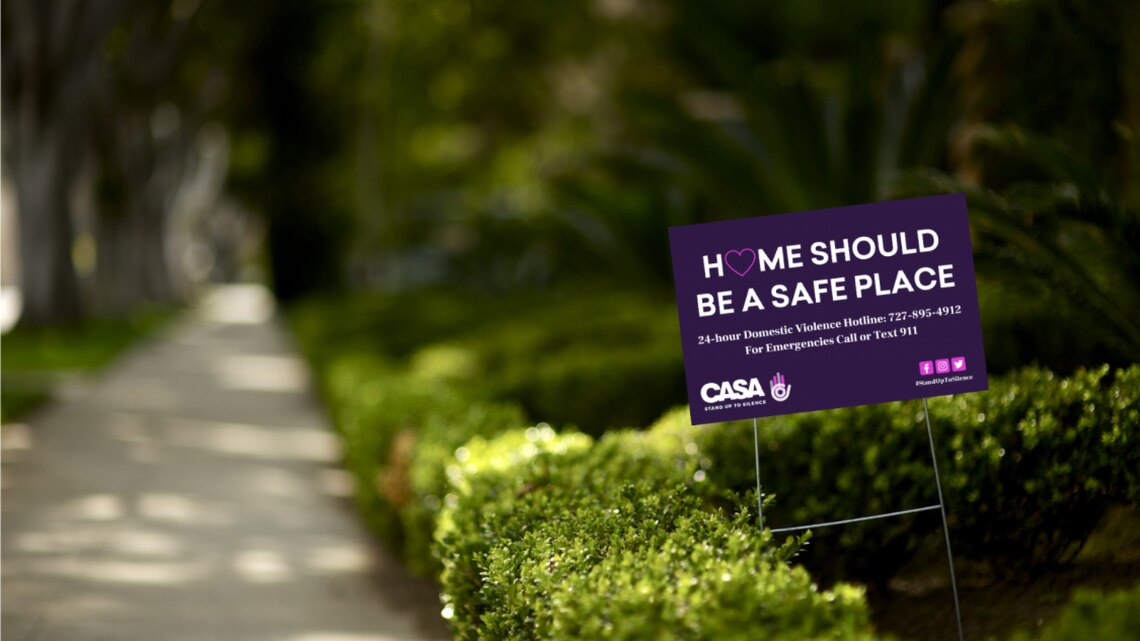Not safer at home: Tampa Bay domestic violence groups report more calls for help
Christopher O'Donnell and Divya Kumar | Tampa Bay Times
Apr 17, 2020

TAMPA — Local and national leaders have touted safer-at-home orders to keep people safe during the coronavirus epidemic.
But trapped-at-home has been the reality for domestic violence victims — mostly women — who have reached out for help in increasing numbers as isolation, stress and financial worries have escalated violence and threats, local support groups said. They expect even more victims will emerge when stay-at-home orders are lifted.
In St. Petersburg, Community Action Stops Abuse, or CASA, has seen a 40 percent increase in calls to its help line since stay-at-home orders were enacted. And call-takers are hearing of more red-flag cases where threats include talk or brandishing of firearms, or the placing of hands around a victim’s neck.
“What we’re seeing is really extreme cases of gun violence, of the strangulation, very, very intense, very scary situations,” said Lariana Forsythe, the group’s chief executive officer.
In Hillsborough County, the Spring of Tampa Bay has seen an uptick in people seeking help to file legal injunctions. And more than 3,000 callers to the National Domestic Violence Hotline in a four-week period through April 14 cited COVID-19 as a factor in their plea for help.
“We are hearing from survivors how COVID-19 is already being used by abusive partners to further control and abuse,” said Katie Ray-Jones, the hotline’s chief executive officer, in an email. “We are especially concerned that survivors will be unable to reach out for help due to their abusive partner monitoring their behaviors while they are in isolation.”
Some local law enforcement agencies also are reporting an uptick in domestic violence 911 calls, but not all.
The Tampa Police Department received 946 domestic disturbance calls in March, compared to 777 in February. Pasco County saw an 11 percent increase in domestic violence calls in March compared to 2019, though the number of reports has slowed in the first half of April.
The number of reports to the Hillsborough County Sheriff’s Office barely rose in March, however. The Pinellas County Sheriff’s Office reported 32 more calls in March compared to 2019.
That may be because victims fear retaliation.
Sgt. Jessica Masecky, with the Pinellas County Sheriff’s Office, said that many times when officers reach the scene, there is evidence of only verbal abuse, so an arrest is unlikely.
Mindy Murphy, chief executive officer of the Spring, said she understands why victims may be hesitant to call law enforcement. Abusers, she said, often have the ability to be “manipulative and charming” at times.
“All of a sudden, the survivor is trapped with the abuser, and they have to be strategic,” she said. “… What is their path out? If the cops come and don’t arrest, and there’s no other option for your safety after that, you’re not going to call. You can’t stay with friends.”
Across the state, Murphy said, the number of people seeking shelter has stayed about the same and in some places has decreased.
Some may be unwilling to move to a shelter, fearing they will be more at risk of contracting the coronavirus, said Kelly Sinn, chief executive officer of Sunrise of Pasco County, a domestic violence center and shelter.
“What we’re seeing, interestingly enough, is the occupancy is down to the lowest it’s been in 10 years,” she said.
Sinn said the shelters follow guidelines from the national Centers for Disease Control and Prevention.
CASA’s shelter normally houses up to 130 people. But it has reduced that to comply with social-distancing guidelines, leaving staffers there concerned they could not deal with an influx of victims. That’s why the group recently reached out to the Juvenile Welfare Board of Pinellas County to cover the $50,000 cost of rehabbing an apartment building it had let lapse for four years because it could not afford maintenance costs.

In just four weeks, the complex was cleaned and repairs made. New appliances and air-conditioners were installed where needed.
The complex can house at least eight large families, said Beth Houghton, the Welfare Board’s chief executive officer. The extra accommodations also mean the shelter will be able to isolate any family members who test positive for COVID-19.
“We saw what CASA saw, and that’s the high stress situation, high unemployment causes increases in domestic violence,” said Houghton. “We wanted to get ahead of it.”
With victims less likely to leave home while stay-in-place orders are in effect, CASA has been advising victims who reach out to develop safety plans.
Those can include signals to supportive neighbors, like placing a plant in a window. They also advise victims to plan out the safest time for them to try to leave an abusive partner and to have an escape route from their home mapped out in the event they are attacked.
“The last thing you want is to be blocked in a room where there is no way out,” said Forsythe.
The goal of domestic violence shelters is not necessarily to encourage people to leave relationships, Murphy said, but to keep them safe. At times, it’s been more than a year or two before the individual was ready to leave, she said.
Like most nonprofits, the centers have been unable to hold traditional fundraisers. They each have Amazon wish lists, and CASA is asking people to purchase yard signs as a way to both contribute and raise awareness of domestic violence.
Domestic violence hotlines:
- Sunrise of Pasco: 352-521-3120
- Community Action Stops Abuse (CASA): 727-895-4912
- The Spring of Tampa Bay: 813-247-7233
- National Domestic Violence Hotline: 800-799-7233
To view the full news story by Tampa Bay Times, visit https://www.tampabay.com/news/health/2020/04/17/not-safer-at-home-tampa-bay-domestic-violence-groups-report-more-calls-for-help/
